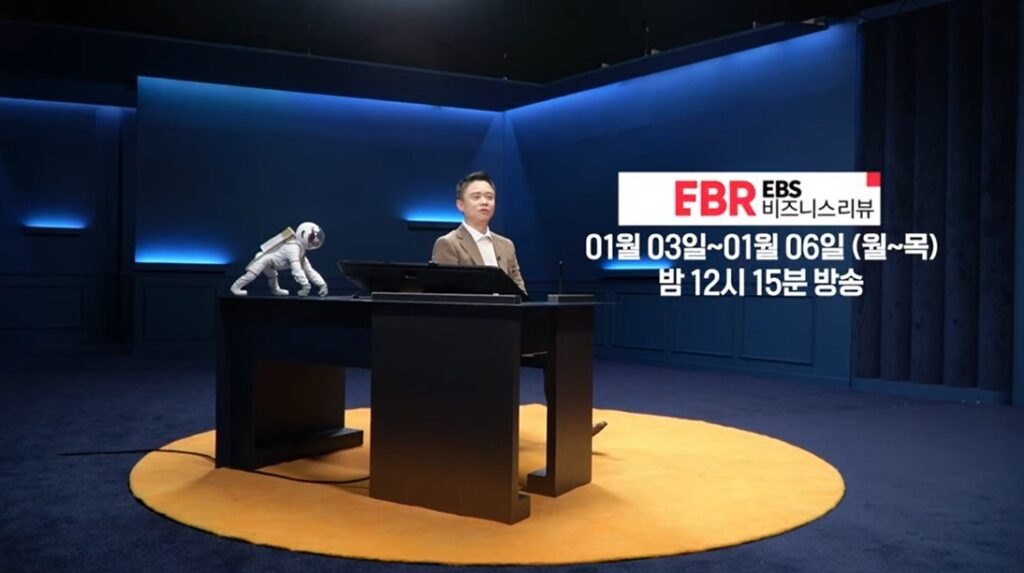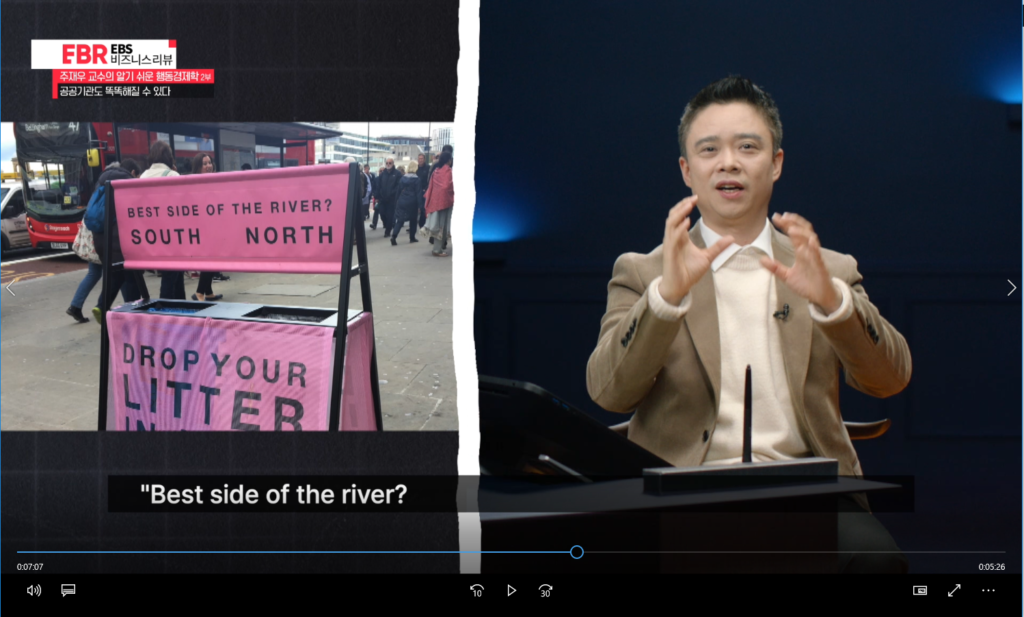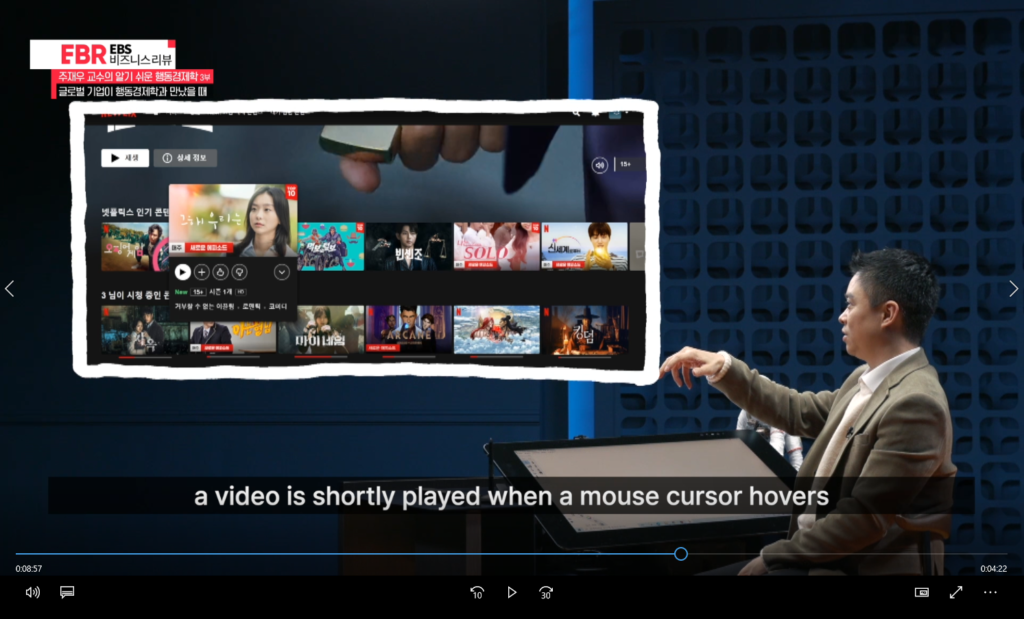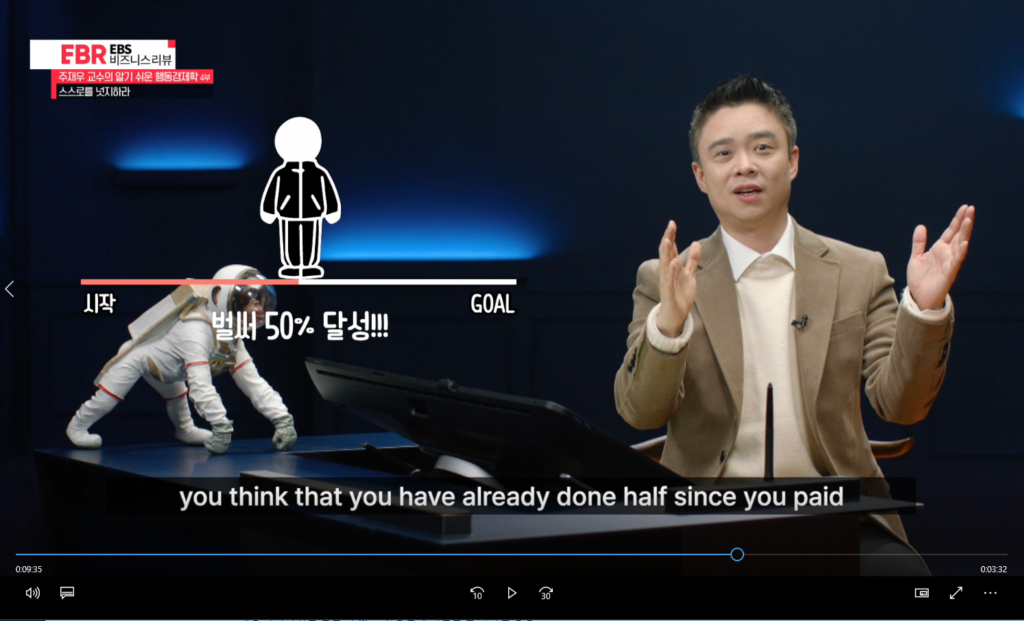Coming January 3rd to 6th of 2022, EBS Business Review will broadcast “Behavioral Economics for Dummies.”
The world-renowned bestseller book, Nudge, by Richard H. Thaler, winner of the 2017 Nobel Prize in Economics, is well known for its coverage of behavioral economics. The term nudge which has an idiomatic meaning of nudging with an elbow refers to guiding people’s choices through gentle intervention instead of compulsion or coercion. Different from normative economics and descriptive psychology, prescriptive behavioral economics intervenes and guides people’s choices by closing the gap between behavior and mind.
What is the hidden key of behavioral economics? You will learn its various cases which show the power that moves the world.
- The secret of 99% adoption of organ donation (January 3rd)
As medical dramas suggest, hospitals need more organ doners. In order to solve the supply-demand problem of organ donation in Korea, a policy was implemented in 2007 which inserts a statement regarding donation into the driver’s license upon issuance or renewal. However, the survey result in 2018 showed that the actual number of those who wish to donate is only about 3%.
What about other countries? If we look into the organ donation rate in European countries in the early 2000s, Denmark had a rate of about 5%, Germany had a rate of about 12%. However, there are many other countries boasting a rate of 99%, such as Portugal and France. What is the secret behind these countries with a high donation rate? We will explore successful uses of behavioral economics that change people’s behavior.
- Public institutions can be smarter (January 4th)
In 2020, an experiment was conducted in US to find out how to increase the vaccination rate for the flu. As a result of sending 20 messages that encouraged people to get vaccinated, the most effective one was the combination of messages sent three days before vaccination saying “a flu vaccine is available for you” and one day before vaccination saying “a flu vaccine has been reserved for your appointment.” For those who received these messages, they made a promise to themselves to get vaccinated, resulting in an increased vaccination rate of about 5%.
Since behavioral economics brings great results with little cost, it is actively applied in many public institutions. Let’s listen to other cases of public policy which solve tough social problems.
- When tech giants meet behavioral economics (January 5th)
Marketing is a key area in which behavioral economics is actively applied. Various mechanisms can be used to target customers, which can lead to an increase in revenue and market share. Lyft, a ride-sharing company once conducted an experiment to encourage users to drive during peak demand times, Friday nights, instead of quiet mornings on Wednesdays.
They divided drivers into two groups randomly. One group was given information that their income would increase if they worked on Friday night. The other group was given information that their income would decrease if they did not work on Friday night. More people in the latter group chose to drive Friday night because people tended to avoid loss, helping Lyft mobilize the drivers’ behavior. What are the other special secrets of behavioral economics that change peoples’ choices and help companies increase profits?
- Nudge yourself (January 6th)
Self control is a process of paying the small pain in the present to obtain a greater gain in the future. But when the pain in the present is overwhelming to bear, people lose their motivation to control themselves. To solve this problem, we have to go beyond the present bias and go back to the past self.
Imagine that alarm wakes you up in the early morning. If you want to overcome the thought of having sleep for one more hour, you need to go back to the ‘me’ last night who set the alarm. To make a rational decision, you have to remember your own attitude of yesterday when getting up early eventually leads to a greater benefit than oversleep. We will introduce the secret of behavioral economics that makes a better ‘me’ based on deep understanding of human.

Jaewoo Joo is a field researcher who applies academic insights to solve real world problems. He received a Ph.D. in Marketing from the University of Toronto after obtaining a Bachelor degree and a Master degree from Seoul National University. Jaewoo is interested in developing customer experience by utilizing empathic design thinking and counter-intuitive behavioral economics. He is an associate professor of marketing and participating professor of experience design at Kookmin University.
References
Johnson, E. J., & Goldstein, D. (2003). Do defaults save lives? Science, 302(5649), 1338–1339.
Milkman, K. L., Patel, M. S., Gandhi, L., Graci, H. N., Gromet, D. M., Ho, H., … Duckworth, A. L. (2021). A megastudy of text-based nudges encouraging patients to get vaccinated at an upcoming doctor’s appointment. Proceedings of the National Academy of Sciences of the United States of America (Vol. 118).
Scheiber, N. (2017). How Uber uses psychological tricks to push its drivers’ buttons, The New York Times, April 2, https://www.nytimes.com/interactive/2017/04/02/technology/uber-drivers-psychological-tricks.html.
Soman, D., & Shi, M. (2003). Virtual progress: The effect of path characteristics on perceptions of progress and choice. Management Science, 49(9), 1229–1250.

 Click on image to play video
Click on image to play video

thanks for info.
I am glad I am helpful
저는 첫 번째 영상을 통해 배달의민족에서 음식을 주문할 때 일회용 수저가 필요없다는 버튼이 기본값으로 설정되어 있다는 사실을 처음 알게 되었습니다. 그동안은 단순히 이전 주문에서 선택한 값이 저장된 것이라고 생각했는데, 실제로는 플랫폼의 선택설계라는 점이 흥미로웠습니다. 또한 영상에서는 덴마크의 약 5% 와 스웨덴의 약 90% 의 장기기증률 차이를 소개했는데, 이는 문화나 그 나라의 제도 때문이 아니라 덴마크는 “기증을 하시겠습니까?”를 스웨덴은 “기증을 하지 않겠습니까?”를 기본값으로 둔 선택설계 때문이라는 설명이 인상적이었습니다. 이처럼 선택의 방식에 따라 결과가 크게 달라질 수 있다는 점에서, 선택설계는 환경 보호나 자원 절약처럼 긍정적인 효과를 낼 수도 있지만 반대로 악용된다면 왜곡된 결과를 만들 수도 있다는 점에서 무섭게 느껴졌습니다. 그래서 저는 이러한 양면성이 행동경제학에서 가장 흥미로운 부분이라고 생각했습니다.